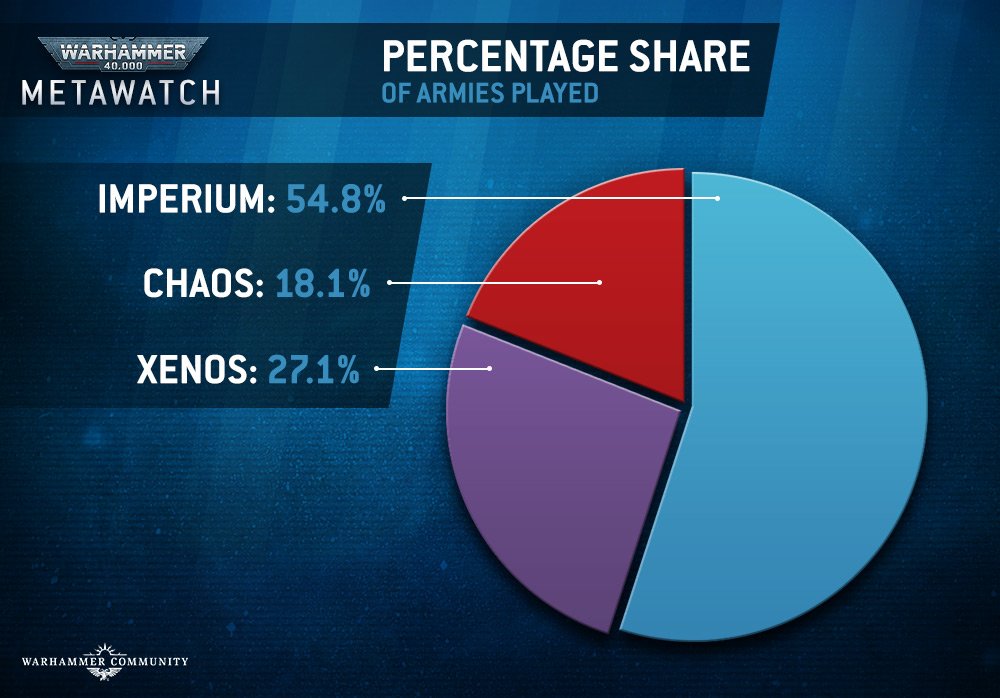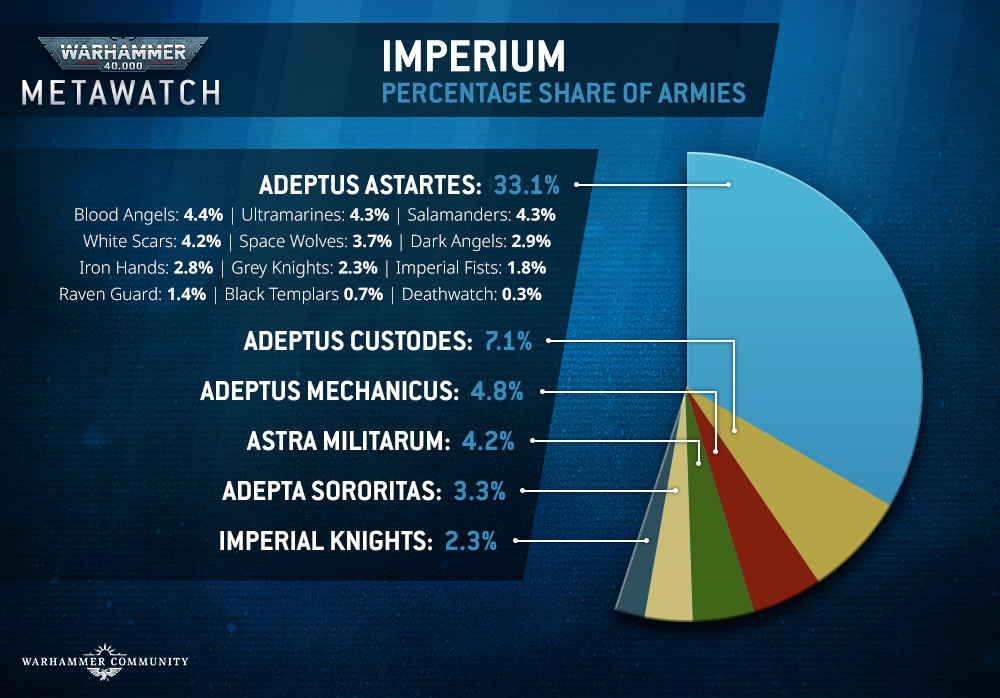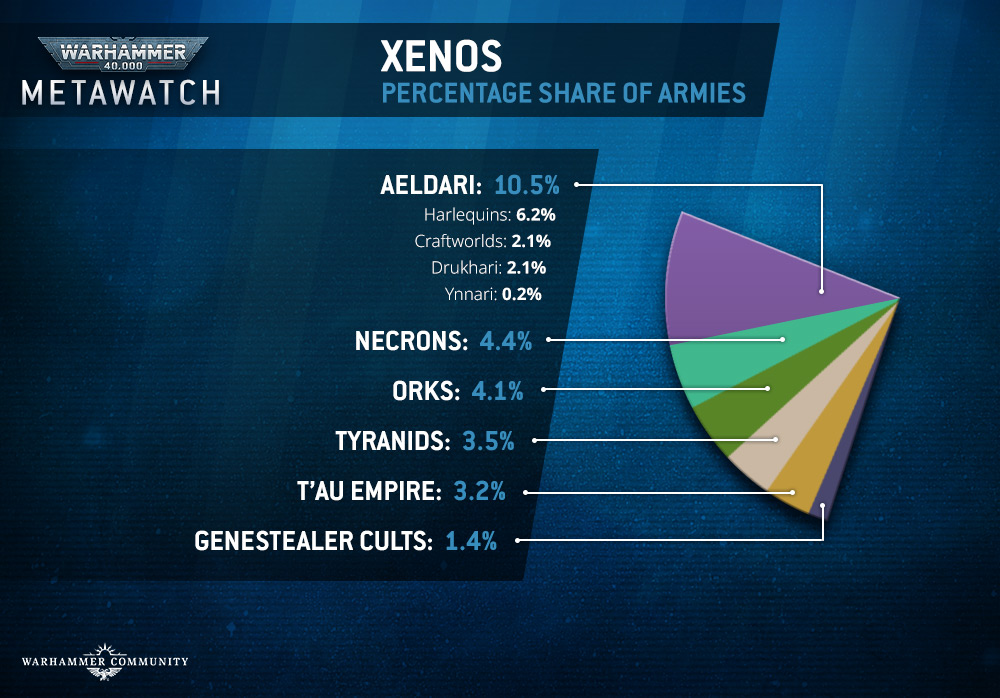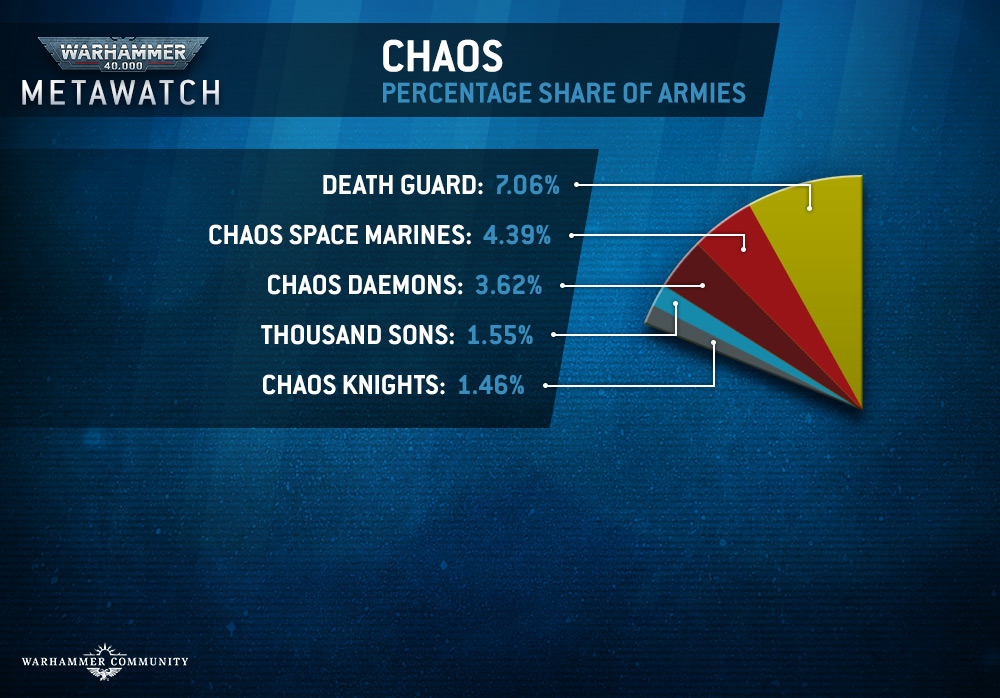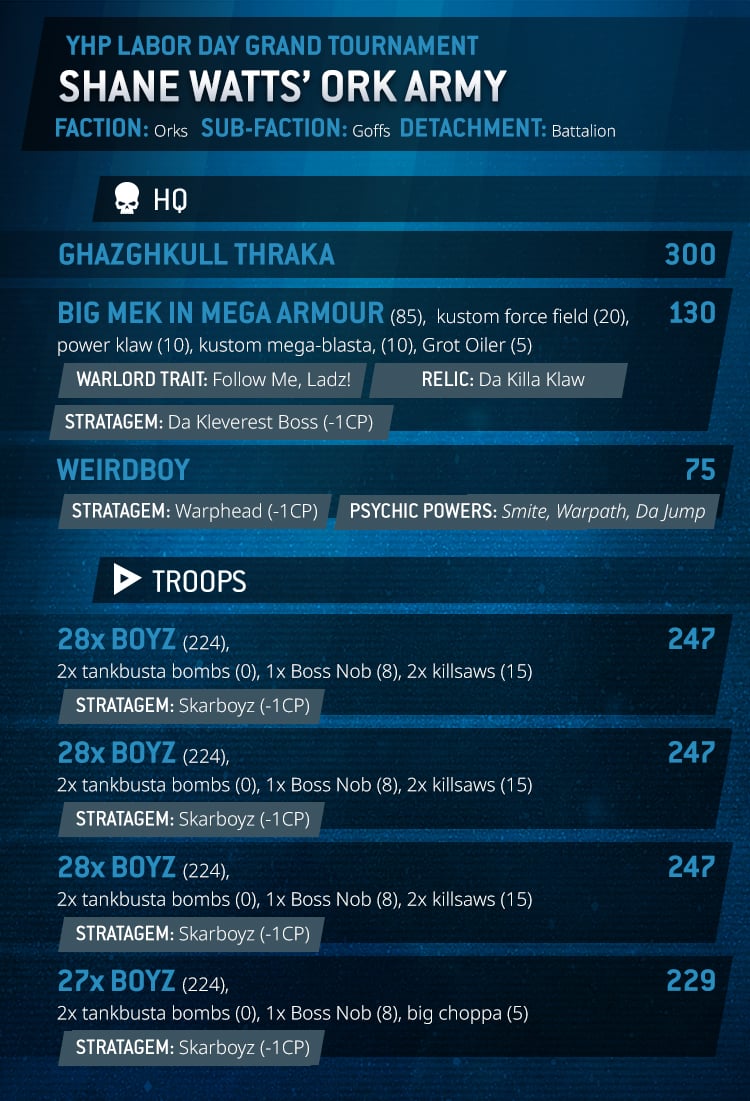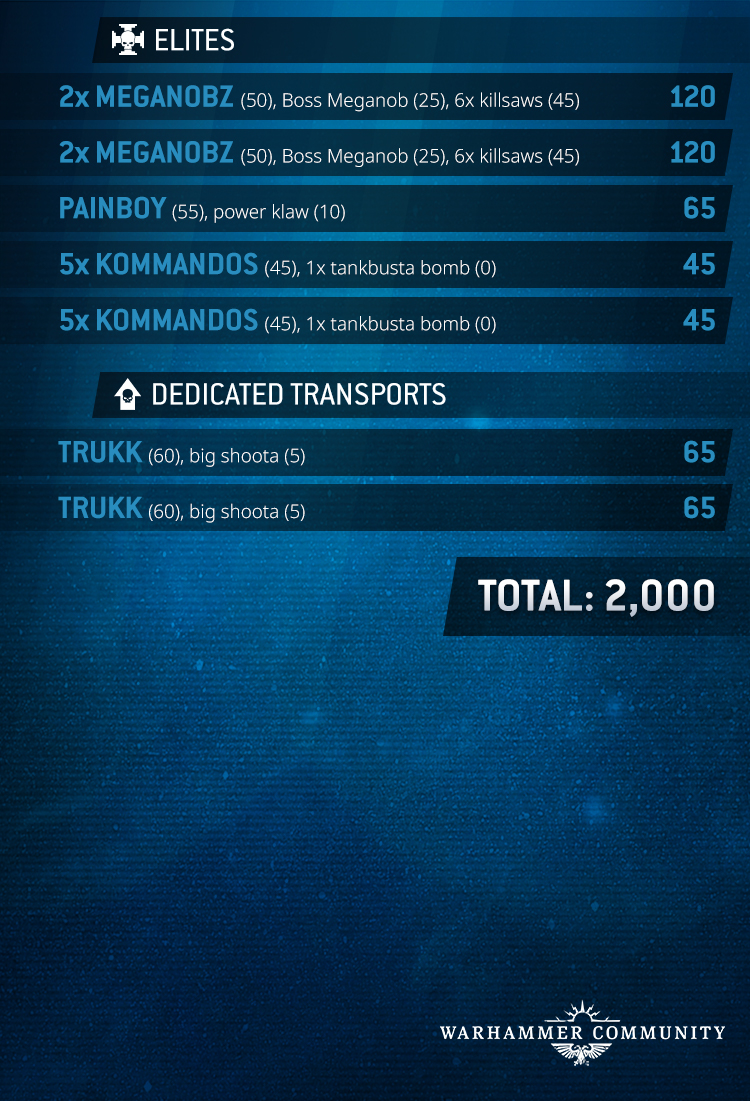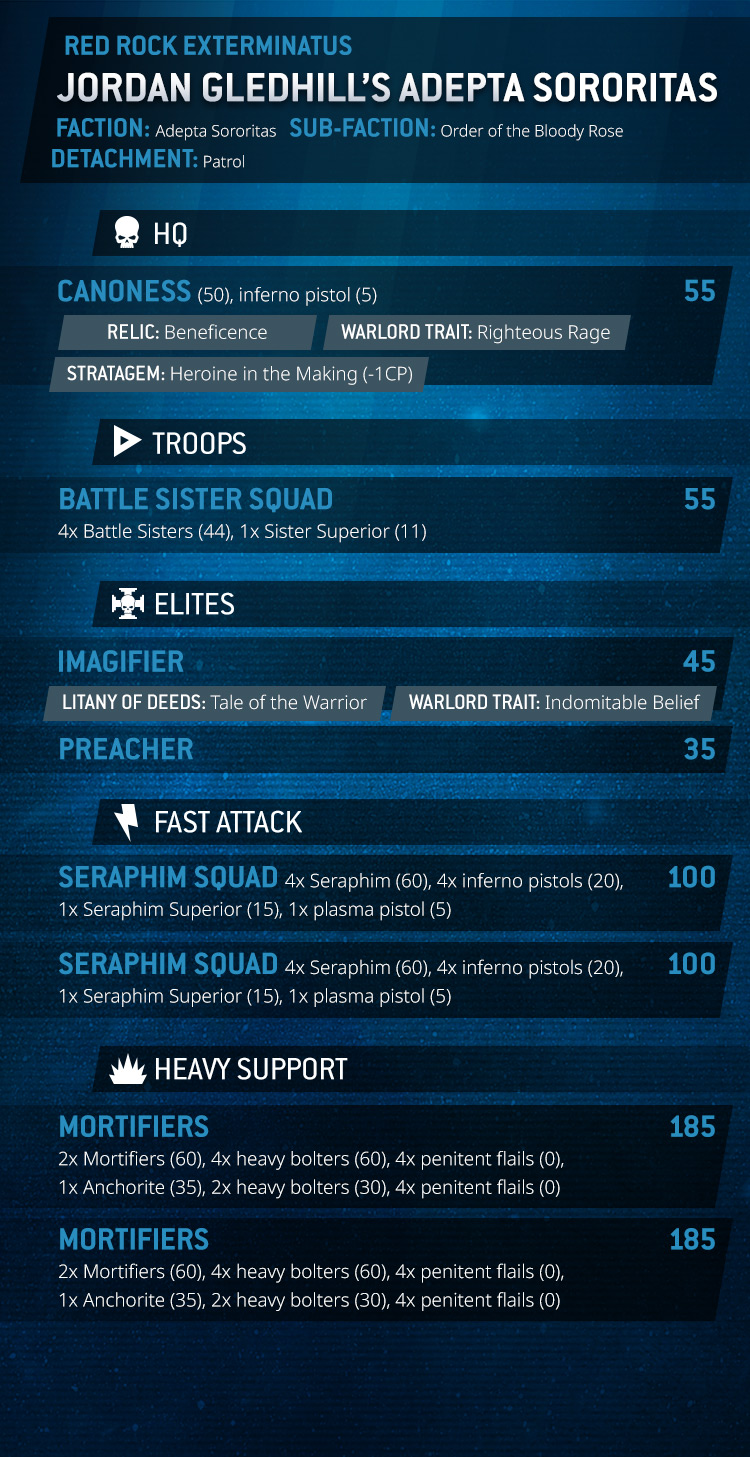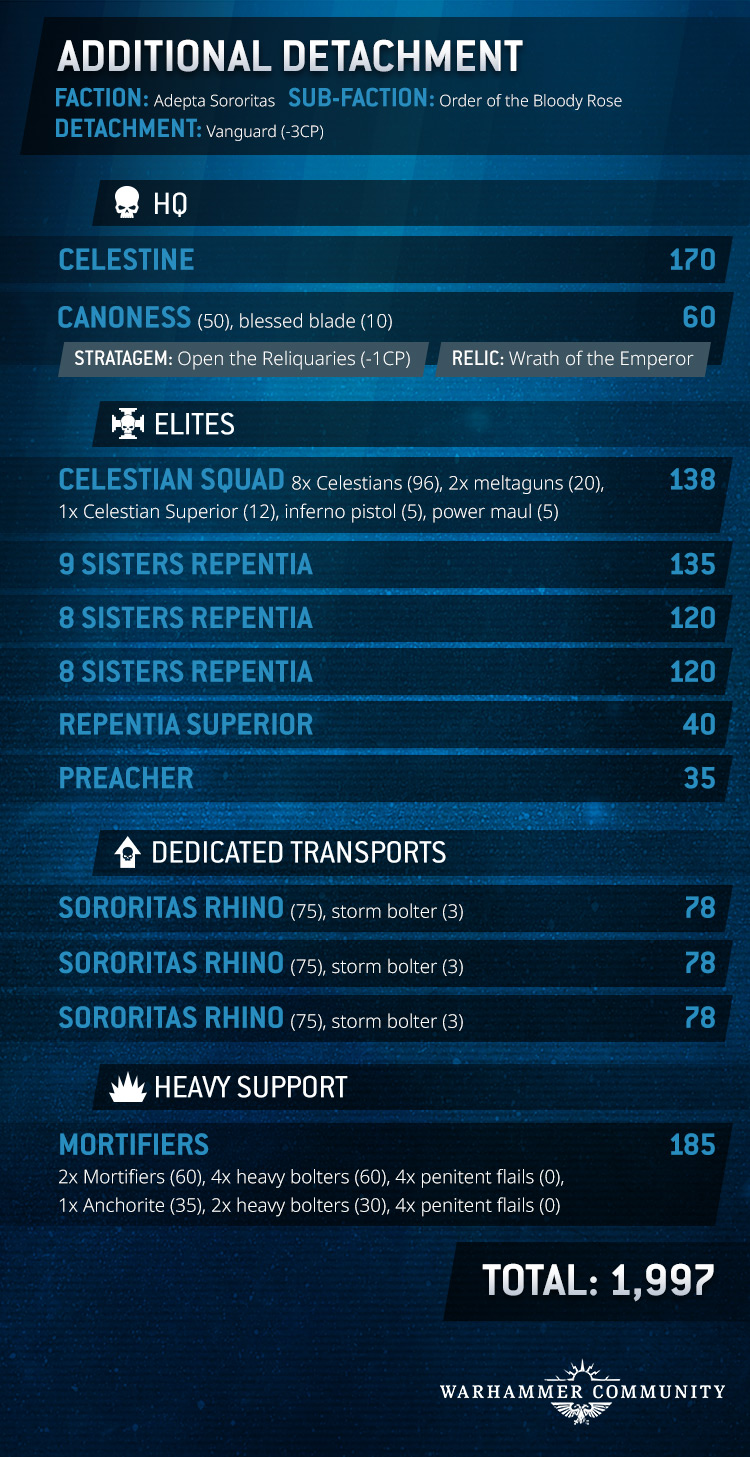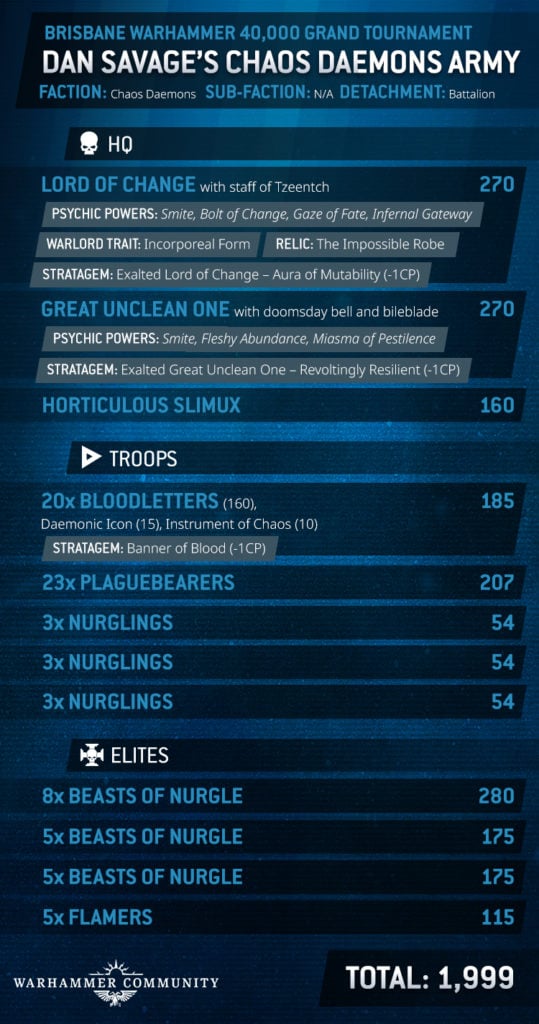
Check out the latest metawatch article from the Warhammer-community team featuring our very own Val Heffelfinger and Peter the the Flacon!
Switch your brain into competitive mode as Mike Brandt is back for a second helping of Metawatch Warhammer 40,000! Let’s hand you over to the man himself to discuss the topic and introduce his guest.
Mike: Hey everyone! Mike here with our second episode of Metawatch Warhammer 40,000! Covering the cutting edge of matched play for Warhammer 40,000 is about more than just hearing the opinions of top players. It includes looking at the data we glean from games played around the world – even during a time of less-frequent events. My first guest for this article, Val Heffelfinger, isn’t known as a take-no-prisoners Grand Tournament champion so much as for his good-natured Canadian spirit, warm sense of humour, and tireless efforts to cover the data behind the Warhammer 40,000 meta as it evolves. He’s also a fundamentally good person, which I’ve found to be an adjective for most folks you run into at Warhammer events!

Val Heffelfinger co-hosts 40K Stats Centre on the Frontline Gaming Network. Together with Peter ‘the Falcon’ Colosimo, our second guest, they interview top performers from each week’s largest events around the world. Val is also an active player who’s travelled far and wide to play Warhammer 40,000 (poorly, says he) at the highest levels of competition. Meanwhile, The Falcon is the creator of 40KStats.com and a data junkie equal to even the most voracious logis of the Adeptus Mechanicus. From his arctic lair at the end of the great northern ice road, he tracks results from every large-scale event happening anywhere on the planet. Take it away, Val!
Val: For the past few years, the Falcon and I made it our mission to explore the tournaments, players, and amazing armies comprising the global Warhammer 40,000 events scene. It’s, therefore, a great honour to be chosen to join the Long Vigil of the Metawatch. We are downright chuffed to see the Warhammer Community team lend this amazing platform to highlight our favourite way to socialise and enjoy the hobby. We share the hope that Metawatch will engage the community and – more importantly – encourage more Warhammer hobbyists to try out Warhammer events!
At the core of our analysis is the hard work the Falcon puts into gathering results. Since starting 40KStats.com in 2018, the Falcon has scrutinised over 20,000 lists and recorded 88,858 results from 44,429 tournament games of Warhammer (as of November 16th, 2020). Thanks to this hard-won data, we actually know stuff about how Warhammer 40,000 is played that we could only guess at a few years ago.
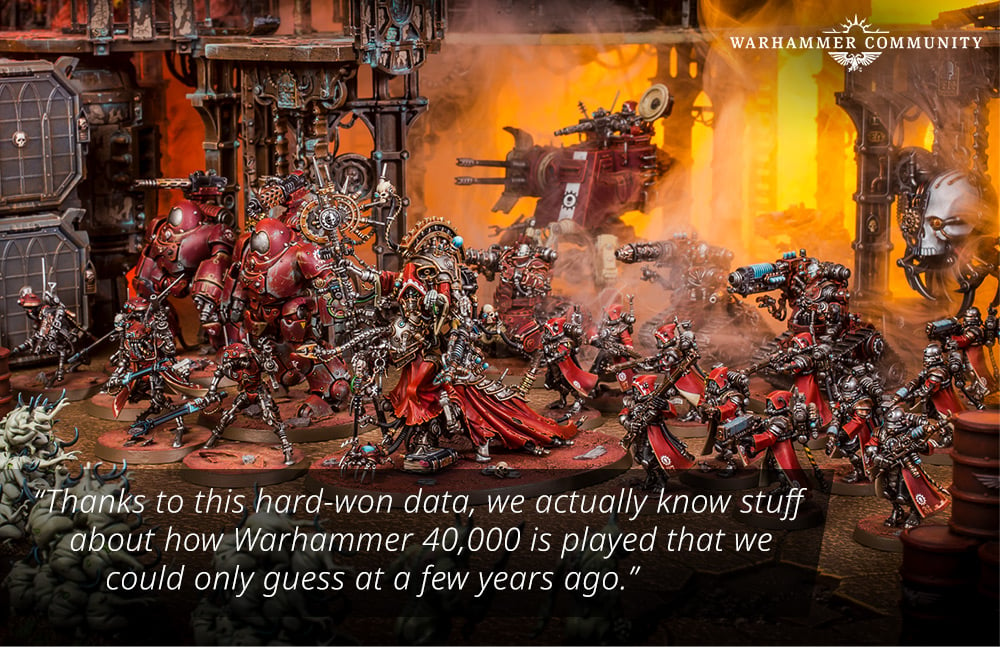
Of course, anyone who has re-rolled a 1 into a 1 will know first-hand that, when it comes to statistics, the Nurgling is in the details. These numbers are not deterministic – it’s up to you to make the most of them and use them to inform your choices as you approach building your list, mastering your strategy and, of course, debating the merits of the meta across the internet.
Finally, it can’t go unsaid that, although there’s been no shortage of enthusiasm for the latest edition, our community hasn’t played nearly as many games as we might like due to current world events. Tournament organisers are taking great care to ensure a safe playing environment when possible, but we understandably don’t have as much data yet as we otherwise would. Often the best way to ensure a safe playing environment is to reschedule events in hard-hit areas for a later, healthier time.
However, there’s still a whole lot of Warhammerin’ going on, and we feel that, with over 28 events and 5,899 results, we can craft a pretty solid picture of where the early meta lies as we head into an exciting series of new codex releases.
What Does the New Meta Look Like?
Val: One way to think about the meta is to imagine the share of these factions evenly distributed at random – each faction would account for 3.2% of those played. Imagine a new hobbyist coming into a store for the first time. They don’t know the rules, the lore, which armies are good, or that they’re going to spend the rest of their lives doing this (just like us!) – they simply pick whichever faction they think looks coolest and off they go.
When we compare to the real world numbers, we can see where certain armies may be in or out of favour with players. As these change over time, you’ll also notice that every army has a dedicated fan base that will keep playing their favourite faction no matter what.
It’s also harder for newer armies to make up a big slice of the field because it takes time to get them ready for battle – armies with sparkling new ranges, like the Adepta Sororitas and Genestealer Cults, are still building up a faithful following!
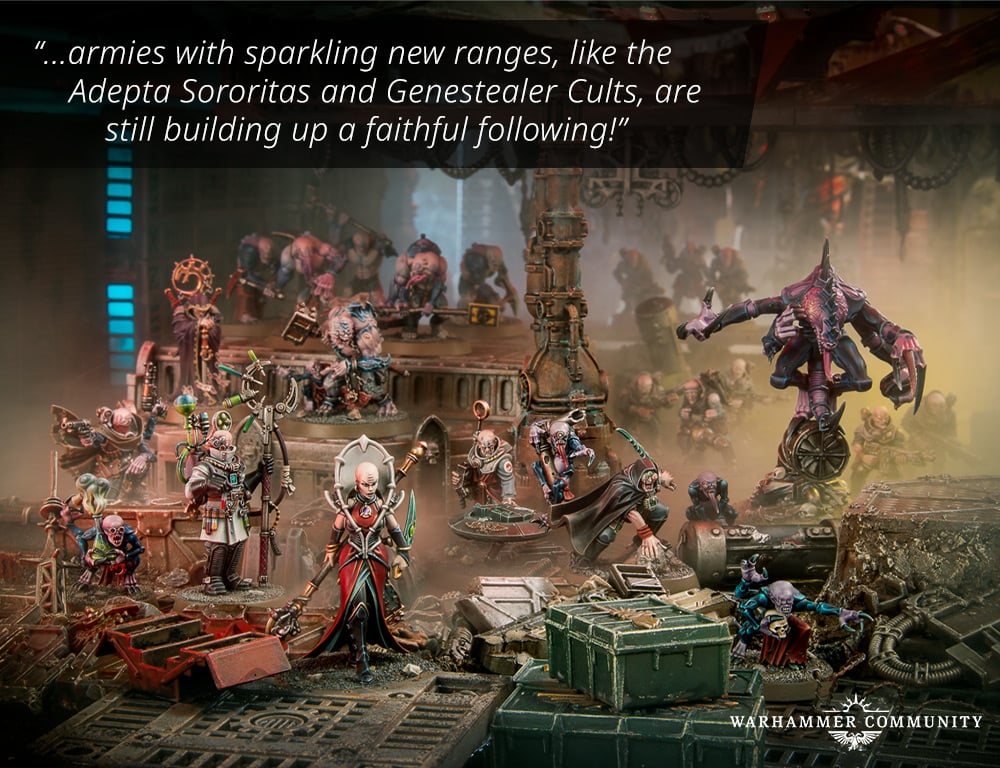
Of course, there’s also the galaxy-spanning elephant in the room – the Imperium of Man. Yes, there are a lot of Imperium factions represented, but it’s about right. Imperium armies make up 55% of all factions brought to tournaments. The thing is, they also account for exactly 55% of all factions available to play!
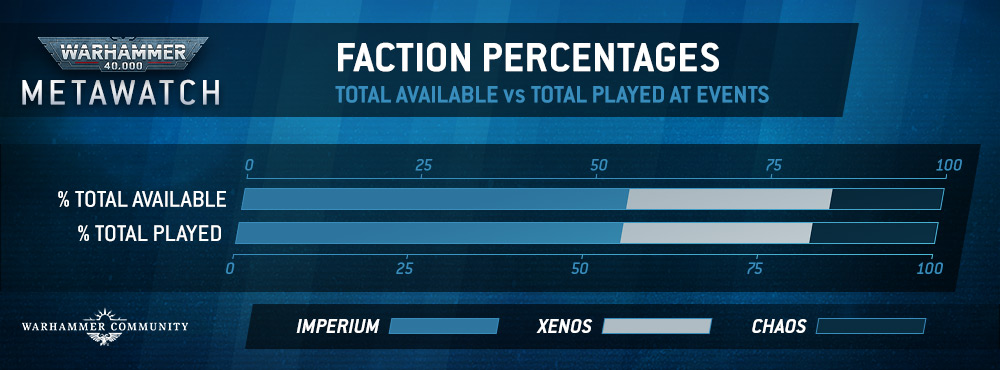
Would you believe Space Marines are actually under-represented?! Despite representing 39% of all playable factions and having some of their best rules in decades, the mighty Adeptus Astartes accounted for only 33% of lists brought to tournaments. Unfortunately, we don’t have exact figures on the number of Primaris Lieutenants used, but we’re pretty sure the meta can sustain a couple more…
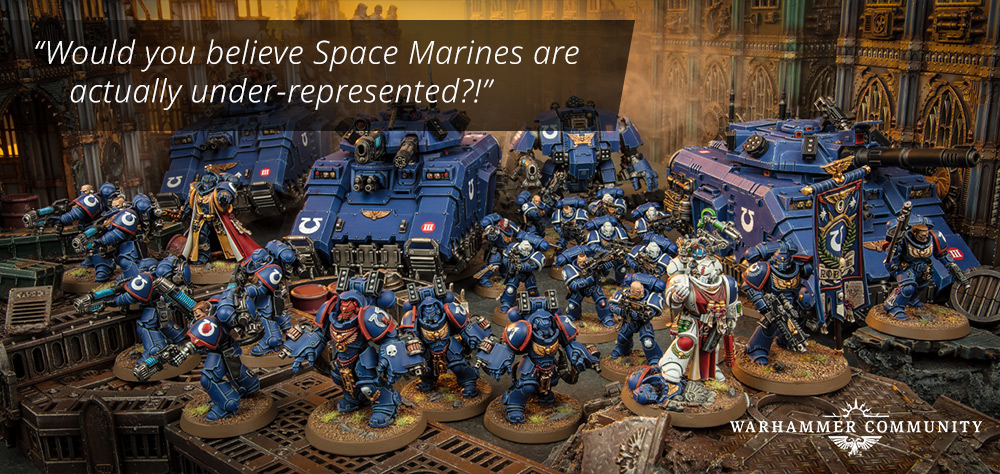
On the other hand, the Adeptus Custodes, Death Guard, and Harlequins all appear significantly more than you might expect. This is the real-world reflection of a general consensus that these factions are particularly well suited to the new Grand Tournament mission format. But does this pan out? How do we use data to explore the performance of a faction on the tabletop? Let’s break down some of the metrics we use to debate with our fellow hobbyists online.
Win Percentage
Pretty straightforward! The total percentage of games a faction wins. End of story right? Well, not quite. While a strong win percentage is certainly a good indication of a faction’s prowess on the tabletop, that’s not all there is to it. To get the full picture, we also need to look at other indicators.
Average Victory Points For and Against
This is a measure of the total number of victory points a faction scores on average versus the total points scored against them. By examining the differential between these scores, we get an idea as to the style of the army – are they smothering their opponents and scoring at will, or does the army wind up in grinding, low-scoring affairs?
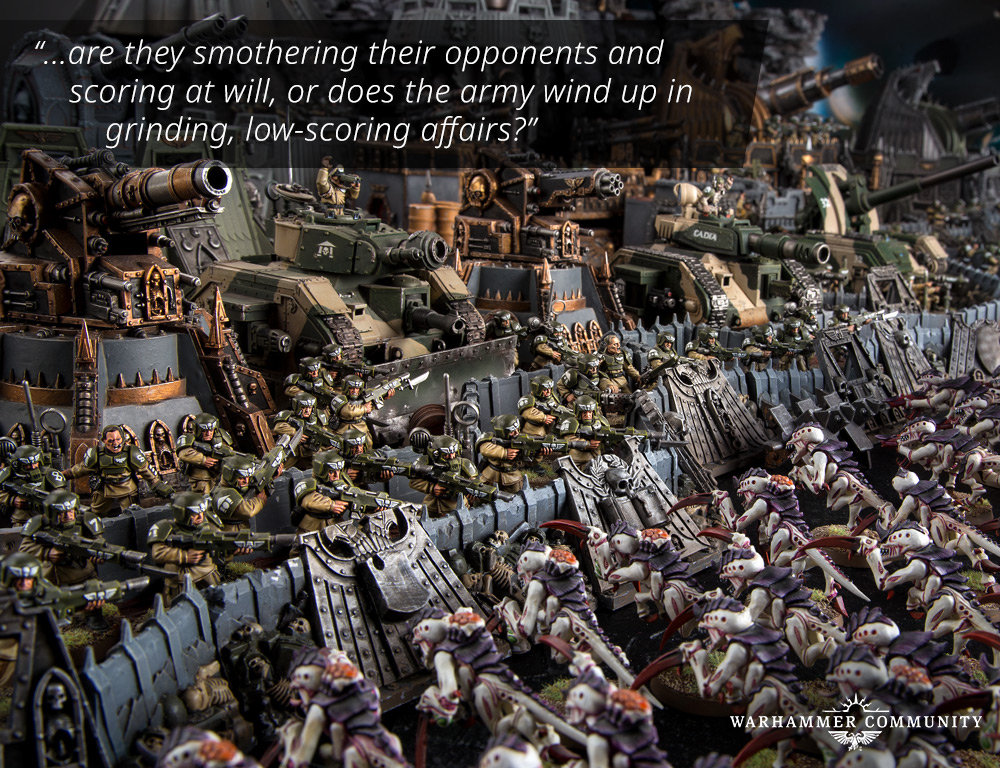
Rounding it all out, we have 40Kstats.com’s own advanced stat…
Tournaments in Winning Position or TiWP [Tee-Whip]
The concept of TiWP is simple – it measures a faction’s share of all armies that achieve a record of 4-0 or greater at events. Most tournaments would require at least a perfect record to have a chance at winning and last five rounds. Therefore, a record of 4-0 indicates a faction is capable of a high enough performance to potentially win an event.
All things being equal, the frequency a faction achieves a 4-0 record (achieves TiWP) should be the same as its share of the field. Therefore, we can simplify the relative performance of factions by creating a ratio – a perfectly balanced TiWP ratio would equal 1 and anything above indicates overperformance.
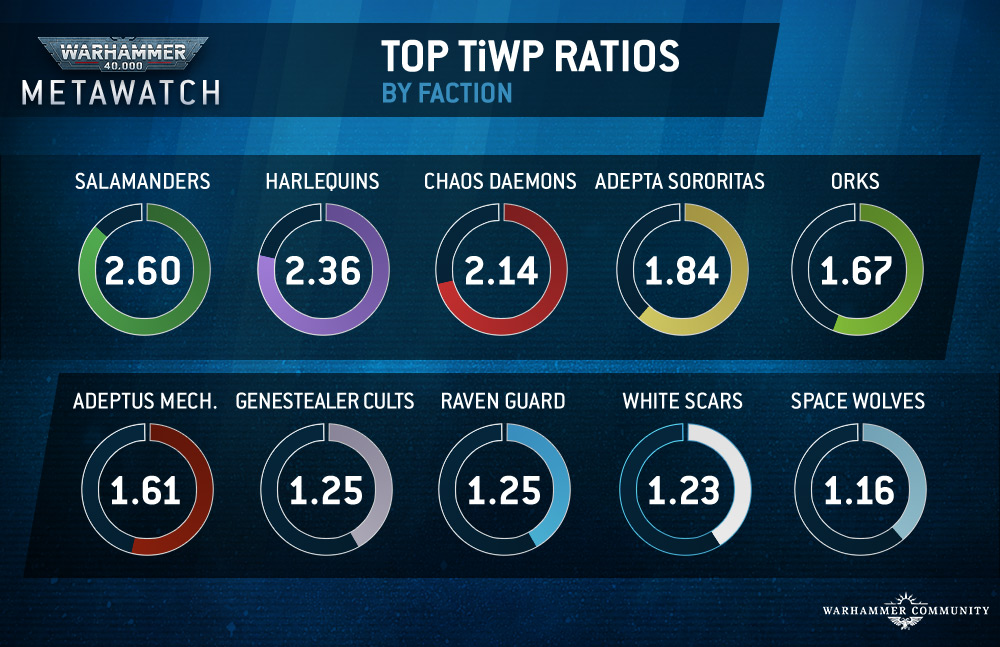
TiWP is also a way to spot player skill. Both the Adepta Sororitas and Adeptus Mechanicus have roughly double their expected TiWP percentage but possess a much lower win percentage than Harlequins. This suggests that these armies have a steeper learning curve, but can perform exceptionally in the hands of the right player or in the right circumstances. This means that player skill matters in Warhammer 40,000.
When you look at these comparisons, what other interesting examples do you see?
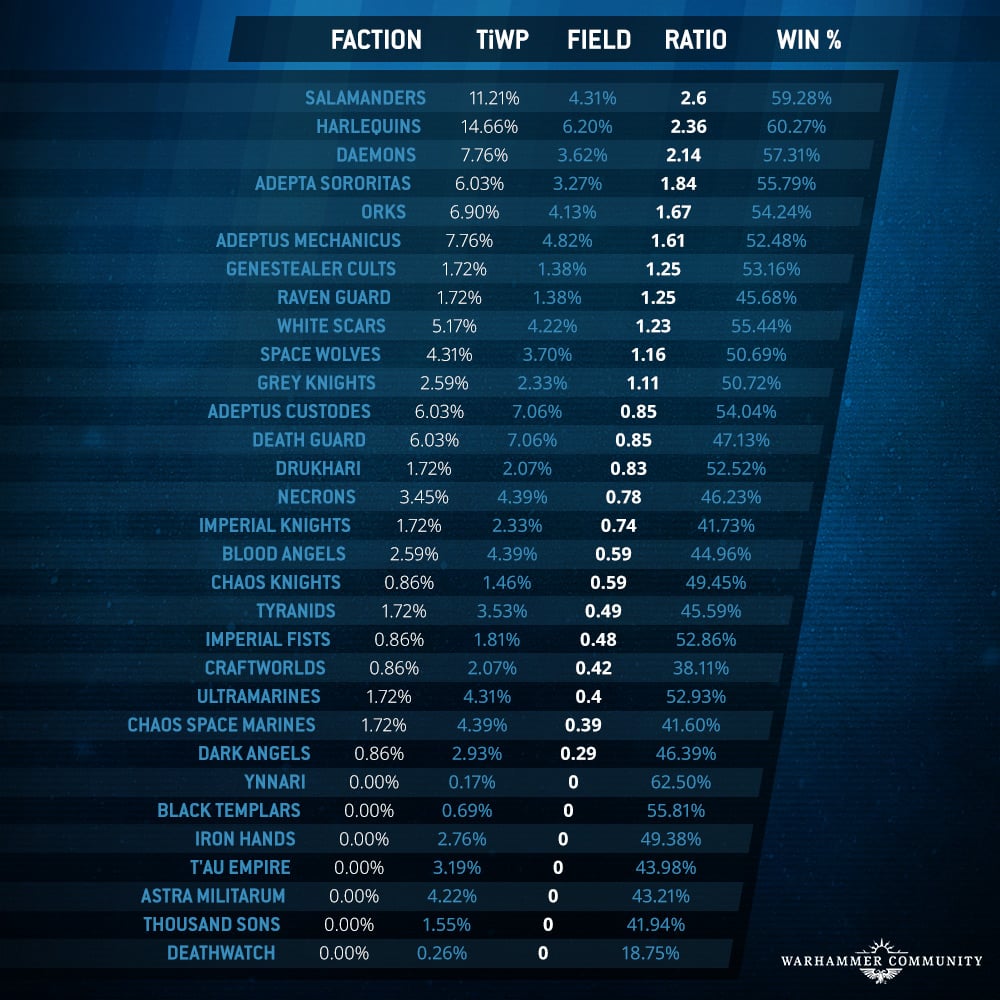
This type of analysis only improves with larger sample sizes. As more results are added and different factions perform well, you’ll see these rankings shift considerably. Perhaps you’ll be the player to lift your favourite faction’s performance. But as exciting as this data is, we know what you’re all here for – really cool army lists. For that, I’ll kick it over to the Falcon to walk us through a couple of recent winners.
Orks
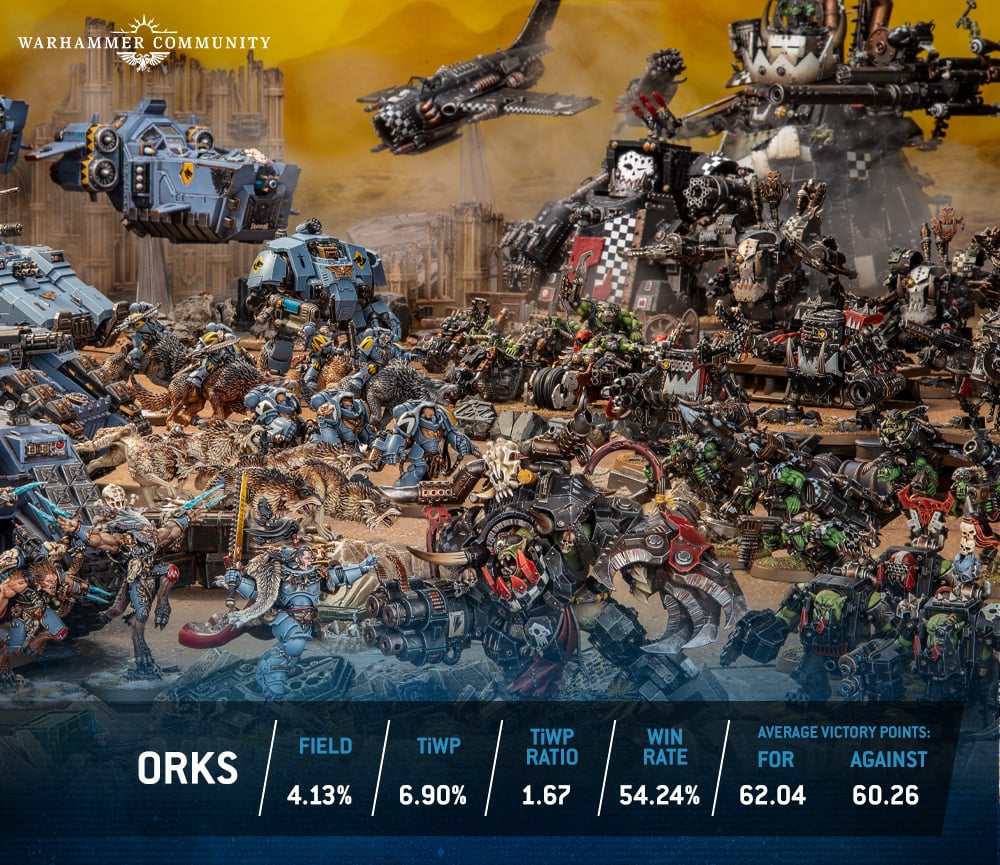
The Falcon: Orks entered the new edition as a bit of an undersquig. The Blast rule and an assumed focus on elite armies led many to think that the green tide was washed out. However, Orks are brutal and kunnin’!
Orks have poured on the dakka, winning four Grand Tournaments and earning top-four finishes in five others. Early list successes featured Speedwaaaghs! relying on Megatrakk Scrapjets and Shokkjump Dragstas to grab objectives and pin opponents. More recently, the secret to Ork dominance is the sneakiest possible taktik: DA LADZ (and da really big boss lad)!
Adepta Sororitas
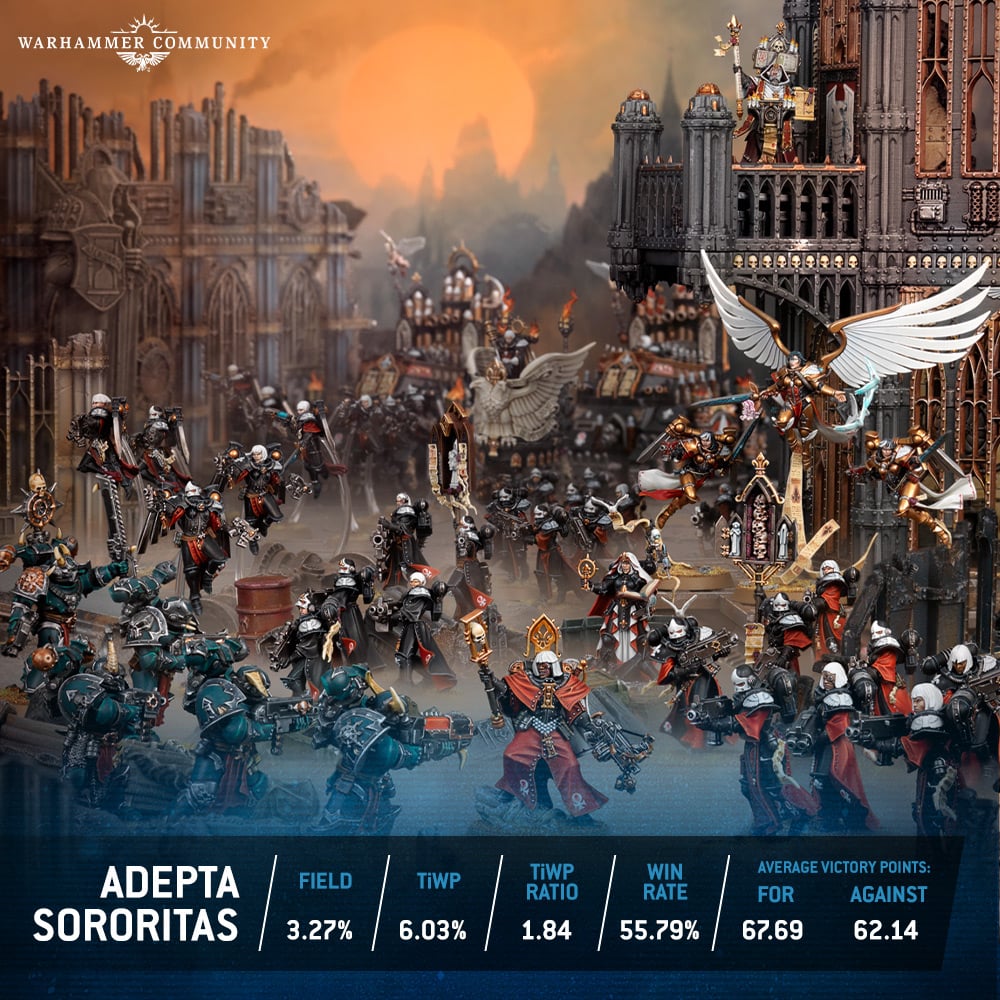
The Falcon: The Adepta Sororitas have been a sleeper hit since they rang in the new year with their first fully fledged codex of the 3rd Millennium. Despite being a low share of the field, they have made it to the top table of three events so far and boast an impressive 54% win rate. They’re poised to get even better with the latest FAQ updates, providing boosts to their Holy Trinity of purging implements: heavy bolters, flamers, and melta weapons.
For competitive play so far, the standout is the Order of the Bloody Rose, who set the pace for the other Orders with an impressive 60% win rate. The additional Attacks and AP go a long way in making list stalwarts like Repentia, Zephyrim, and Seraphim even deadlier. Meanwhile, the arrival of the spectacular Mortifiers added an extremely efficient mid- to long-range threat that can’t be ignored. These holy rollers are definitely a Falcon favourite.
Chaos Daemons
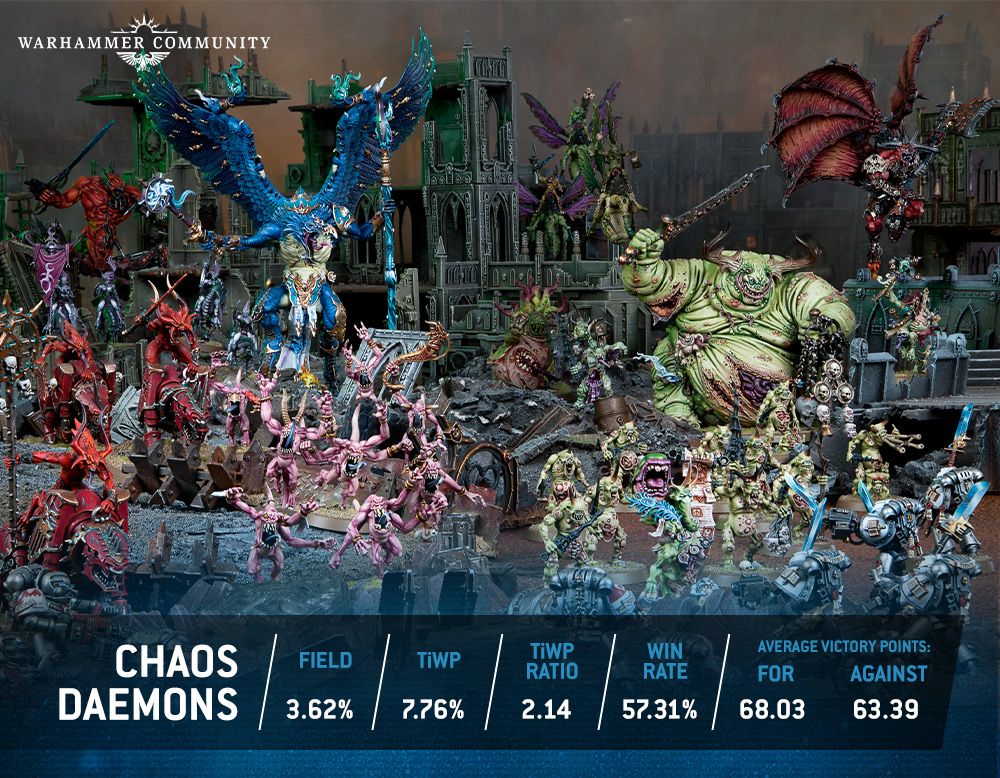
The Falcon: After a brief banishment to the Immaterium of underperformance, these servants of the warp have summoned up a whole new attitude for the new edition. Chaos Daemons have won two events and placed top-four in four others. Only Salamanders and Harlequins possess better win rates, but no other factions are doing it with such a wide variety of lists.
In only a few short months, we’ve witnessed a horrifying array of abominations manifested on the top tables of tournaments. Khorne has been predictably berserk. Sultry devotees of the Dark Prince unleashed a flurry of delightful agonies from the safety of the new terrain rules. Mixed forces held onto objectives with the aid of Grandfather Nurgle, while Tzeentch reminded us that it was all according to plan through their mastery of the Psychic phase. Daemons have proven to be absolutely incredible at playing the missions so far, and with all of the emotions they’ve surely stirred up in their opponents, we can only expect them to grow even stronger still!
Mike: I want to give a big thanks to Val and the Falcon for their thoughts and insights on the meta of Warhammer 40,000 today. Stay tuned to Metawatch as we dig deeper into the numbers. We’ll continue to source the input of awesome players – especially for those factions that appear to be struggling a bit – to provide you with hints and tricks to succeed on the tabletop with whichever faction is your favourite!
While some events are happening and data can be really fun to dig into, we want to encourage our community to be safe, be patient, and paint those models up in the meantime. Remember, it’s the uniform that makes the Guardsman/Fire Warrior/superhuman heretic, and you’ll want your force to look its Battle Ready (or better) finest when you find yourself at an epic Warhammer Grand Tournament. Metawatch will be with you every step of the way.
Thanks, gents! Metawatch will be back soon with a Warhammer Age of Sigmar edition to sink your teeth into. In the meantime, let us know what you think of all the fascinating data revealed in this instalment on our Warhammer 40,000 Facebook page – there’s certainly plenty to discuss!

